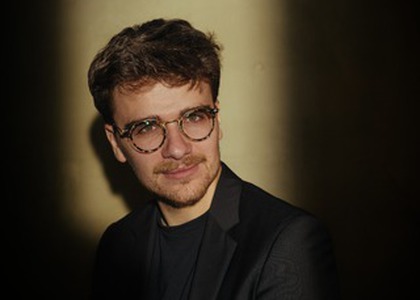> Interviews

Interview with pianist Andrei Gologan (II)
The pianist Andrei Gologan will give an extraordinary recital in the Great Hall of the Romanian Athenaeum on Wednesday, 13th November 2024, as part of the series "Heirs of Musical Romania", organized by Radio România Muzical and Rotary Club Pipera. Andrei Gologan gives us more details about his debut on the Athenaeum's stage, as well as about other aspects of his artistic career so far, in the second part of a dialog with our colleague Ioana Țintea.
How was the transition from the Romanian to the international stage for you? What challenges have you faced?
I can't say that I "lived" the stages in Romania. Coming from Piatra Neamț, I didn't really have much contact with the more important cultural cities - Iași, Cluj, Bucharest... Of course, I took part in competitions very often, but I didn't have the feeling of being part of the Romanian music stage. A stage really opened when I moved west, to Salzburg. Slowly, slowly, I won various international competitions and that's how my career started. So, I first got to know the stage in Western Europe and then, in the last few years, I came back to the country for the Enescu Festival and now at the Athenaeum.
During all this time, you have had the opportunity to collaborate with many renowned musicians. How has each of these experiences influenced your artistic development? Are there any artists or collaborations that have particularly marked you?
I would name Sir Andras Schiff. He was an extraordinary mentor. I even remember the day when I met him and I played him some Schumann, Haydn, Debussy, and right then he said, "You are a very talented boy! We will keep in touch, and I will try to help you." And, indeed, he kept his promise. He invited me to play a series of recitals on big European stages - in Berlin, in Bonn and so on. He was not only the one who helped me to discover European stages and motivated me, but of course he is a master, a living legend who, in addition to the information I had gained through my studies in Salzburg and Cologne, he further refined the conception of an artistic interpretation, the role of an artist and the role of a performer. He is clearly one of my most important mentors. Then there was Daniel Barenboim, but also the so-called Budapest school with Ferenc Rados and many others who contributed to the way I see music.
You have won numerous international competitions, which has strengthened your artistic career. Considering this experience, do you think that taking part in competitions is essential for the development of young musicians?
In a certain way, yes, it is essential, because it clearly forces you to prepare very seriously for these events. And that has happened for me and, I'm sure, for everyone. What can be said about the competition, precisely this competitive element that cannot, after all, be judged by people with certain personal experiences... Music is part of us, the performers, and the listeners. It is very difficult to judge it in an objective way. So, for me, competitions were indeed an important point in my development, but I wouldn't say crucial. Early on I tried to break away from that competitive element and go deeper into creativity.
What advice would you give to those preparing for such experiences?
Don't take them too seriously. Failure is inevitable, it happens to everyone. So often we hear how this or that pianist, winner of first prize or top prize at last week's competition, next week doesn't even make it past the first round. Certainly, competitions cannot be taken very seriously. Let's just say that if they end in a positive event, then all is well and good. And, in any case, let's consider this educational aspect and the aspect of pressure put on us. And, basically, of a certain discipline with which we must treat taking part in a competition.
Coming back to the event on November 13th, I would like to ask you what are you looking forward to this recital, given that it will also be your debut on the stage of the Romanian Athenaeum?
You can imagine! The Athenaeum is a pantheon of European culture, it is an emblem of our country, of our culture, but not only of our country, but of the whole continent. It is a very special moment, as you can imagine, for me to come back not only to Romania, but also to the Romanian Athenaeum. I'm coming back with emotions, very positive, I'm looking forward to seeing many friends but also many unknown faces and I want to share my music with the audience in Bucharest.
Translated by Bianca-Daniela Penaru,
University of Bucharest, Faculty of Foreign Languages and Literatures, MTTLC, year II
Corrected by Silvia Petrescu














